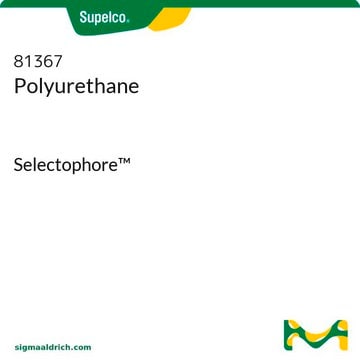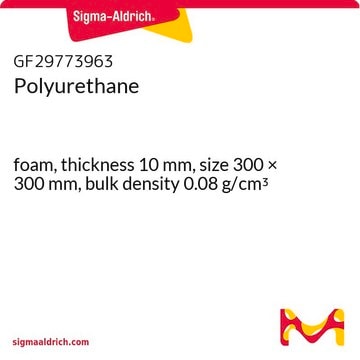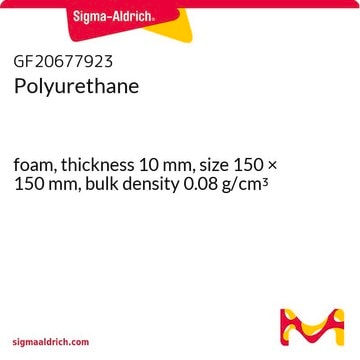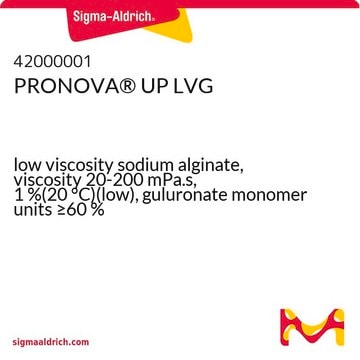446084
Polyurethane diol solution
average Mn ~320, 88 wt. % in H2O
Synonym(s):
PU Diol Concentrate
Sign Into View Organizational & Contract Pricing
All Photos(2)
About This Item
Recommended Products
form
liquid
Quality Level
mol wt
average Mn ~320
composition
urethane, 37%
concentration
88 wt. % in H2O
refractive index
n20/D 1.47
viscosity
8,000 cP(25 °C)(lit.)
acid number
0.6 mg KOH/g(dry basis)
hydroxyl value
350 mg KOH/g(dry basis)
solubility
H2O: soluble
density
1.14 g/mL at 25 °C
General description
Polyurethane diol solution (PUD) is a synthetic polymeric solution that is used as a modifier that is formed by condensation of isocyanates and polyalcohols. It modifies water soluble resins and emulsions which can be used in automotive coating applications.
Application
Modifier for water-soluble resins and emulsions in wood, appliance and auto coatings.
PUD may be used to control the cohesion of silver (Ag) inks which can be printed to form transparent conducting electrodes. These printed electrodes can be used in the fabrication of organic solar cells (OSCs). It may also be used as an electrolyte for dye sensitized solar cells (DSSCs).
Features and Benefits
Hydrolytically stable, improves flow and leveling and gives high film hardness.
Physical form
Dihydroxy-functional oligomer. Aliphatic urethane of proprietary composition
Other Notes
This product contains both primary and secondary hydroxyl functionality.
Storage Class Code
10 - Combustible liquids
WGK
WGK 3
Flash Point(F)
Not applicable
Flash Point(C)
Not applicable
Personal Protective Equipment
dust mask type N95 (US), Eyeshields, Gloves
Choose from one of the most recent versions:
Already Own This Product?
Find documentation for the products that you have recently purchased in the Document Library.
Customers Also Viewed
Isolation of a Pseudomonas aeruginosa strain from soil that can degrade polyurethane diol.
Mukherjee K, et al.
Biodegradation, 22(2), 377-388 (2011)
Roll-offset printed transparent conducting electrode for organic solar cells.
Kim I, et al.
Thin Solid Films, 580(2), 21-28 (2015)
High efficient plastic solar cells fabricated with a high-throughput gravure printing method.
Kopola P, et al.
Solar Energy Materials and Solar Cells, 94(10), 1673-1680 (2010)
Effects of Sodium Iodide (NaI) on Electro-Conductivity with Polyurethane-Diol Organic Electrolyte for Dye-Sensitized Solar Cell (DSSC).
Solid State Phenomena, 268(10), 358-362 (2017)
Our team of scientists has experience in all areas of research including Life Science, Material Science, Chemical Synthesis, Chromatography, Analytical and many others.
Contact Technical Service





![Poly[4,4′-methylenebis(phenyl isocyanate)-alt-1,4-butanediol/di(propylene glycol)/polycaprolactone] pellets, MDI-polyester/polyether polyurethane.](/deepweb/assets/sigmaaldrich/product/structures/661/697/b23c24ce-15fb-4eae-a30f-786921d4c91e/640/b23c24ce-15fb-4eae-a30f-786921d4c91e.png)




![Poly[trimethylolpropane/di(propylene glycol)-alt-adipic acid/phthalic anhydride], polyol average Mn ~500](/deepweb/assets/sigmaaldrich/product/structures/754/225/6e993d83-6b18-473b-a939-bb203d2680fa/640/6e993d83-6b18-473b-a939-bb203d2680fa.png)